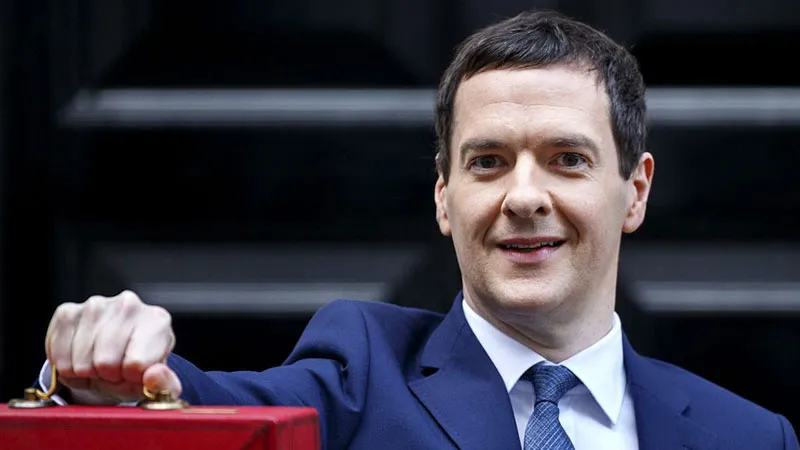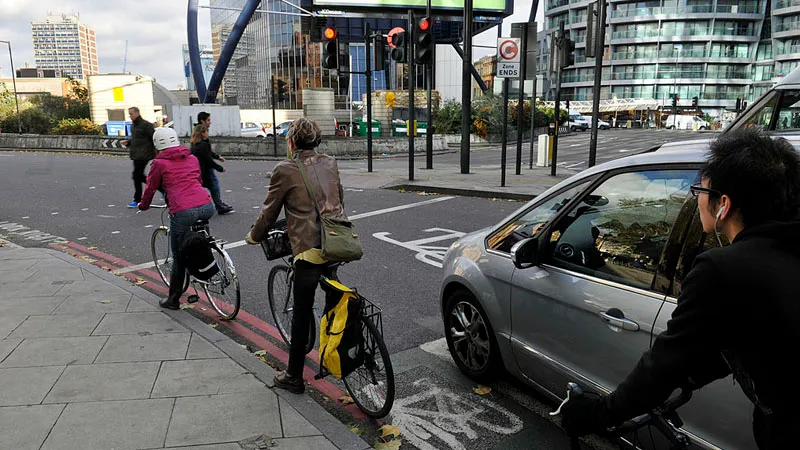British chancellor George Osborne has just unveiled the 2016 spring budget. Inside that red briefcase were a few surprises – as well as a few disappointments – for cyclists in the UK.
Of key interest to cyclists are spending announcements for transport infrastructure, a new tax on sugary drinks, and a rise in insurance premiums.
1. More money for transport and infrastructure – but no mention of cycling
Noticeably absent from the budget was any specific mention of money for cycling. Osborne committed £230 million for road improvements in the North of England, specifically mentioning the M62 motorway, but no details were forthcoming as to whether this might extend to the development of new cycling infrastructure or desperately needed improvement to current networks. Other transport development mentioned included new rail lines, notably HS3 between Manchester and Leeds, and Crossrail 2 in London.
The dearth of commitments to cycling is something that British Cycling has flagged up. "The Budget's focus on major transport infrastructure will be a big test of how the planned investment in roads and rail can integrate cycling." said Martin Key, British Cycling's campaigns manager. "We need to see action on the Prime Minister's clear and public commitment to cycle-proofing, meaning that cycling is designed in at the start of all transport developments. This will not only reduce congestion on our roads and trains at rush hour, it will also tackle other major issues facing Britain such as the obesity crisis, climate change and fuel emissions."

British Cycling called for 'cycle-proofing' of all infrastructure projects from the outset
"We should be allotting 5% of these budgets to cycling, to hit the government's own targets to increase active travel, capitalising on cycling's unique ability to transform people's lives for the better." Key continued. "We must ensure that the chancellor and ministers across government work together to realise these ambitions instead of only focusing on modes of transport that do not delivery such wide-reaching benefits."
2. A reduction in the Severn Bridge crossing toll
The budget held good news for those who like their mountain biking with a Welsh flavour with the announcement that the Severn Bridge toll would be halved. The trail centres in South Wales such as Afan, Brechfa and BikePark Wales are popular destinations, and riders travelling from the English side of the Bristol Channel currently pay £6.60 per car or £13.20 per van. Combined with the freeze on fuel duty, this makes a small but not insignificant saving, though the toll reduction won't come into force until 2018.
3. Rising Insurance Premium Tax
Insurance Premium Tax, which has a knock-on effect on the price of many other insurance policies such as travel, motor, health and home insurance, sees its second rise in six months. The tax jumped from 6% to 9.5% in November 2015, and Osborne has now raised this again to 10%.
To give you an idea of the likely financial implications of this, the Association of British Insurers states this will add around £13 to the average motor insurance policy. This means that covering your car, insuring your bikes against theft, covering yourself in case of injury, and even insuring your trail dog will become noticeably more expensive.
4. A new soft drinks tax
Praised by some, criticised by others, one divisive new tax is a levy charged to companies that produce sugary soft drinks. The new soft drinks tax will come into effect in two years, allowing time for manufacturers to alter their ingredients. The tax will apply to manufacturers, and it remains to be seen whether they will choose to absorb the financial hit or pass it on to consumers by increasing prices. The money raised – estimated to be in the region of £250 million, will go towards supporting primary school sports.
There will be two levels of taxation: one for drinks containing 5g of sugar per 100ml or more, and a second, higher levy on drinks containing above 8g of sugar per 100ml. Diet drinks, which contain sweeteners rather than sugar, are exempt, as are fruit juices and milk.
It's unclear as of yet whether this tax is likely to impact sports drinks, which weren't specifically mentioned. The majority of energy and recovery drinks consumed by cyclists come in a powdered form, which may mean they are exempt. On the flipside many do contain sugar in various forms including fructose and maltodextrin, rather than artificial sweeteners, which could mean their manufacturers are liable. We're waiting to find out more and will update this article once we get further details.
One product that will almost certainly fall foul of the new tax is Red Bull. With a whopping 11g of sugar per 100 ml – the equivalent to over six teaspoons of sugar per 250ml can – the company will be liable for the higher taxation bracket. What impact this is likely to have on Red Bull, which sells over five billion cans worldwide every year, is as yet unclear. As one of the major sponsors for mountain biking and BMX, both in terms of individuals and events, a financial hit could potentially have a knock-on effect for the sport as a whole.
5. Brexit
Osborne also used the opportunity to make a further case for the UK to remain in the EU. Anyone who is or has been booking cycling holidays to the continent for 2016 will already have felt the first effects of a market made nervous by the upcoming referendum, with the sterling to euro exchange rate falling firmly on the unfavourable side. This has increased the relative price of many holidays, and may yet also have an effect on the price of imported products.


